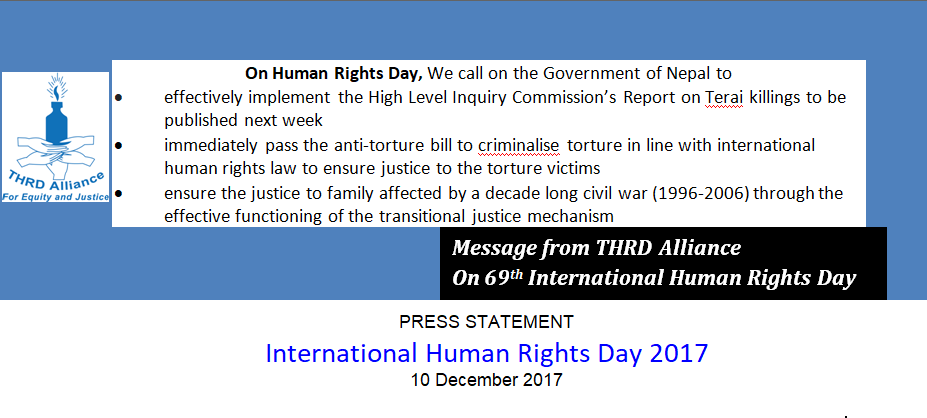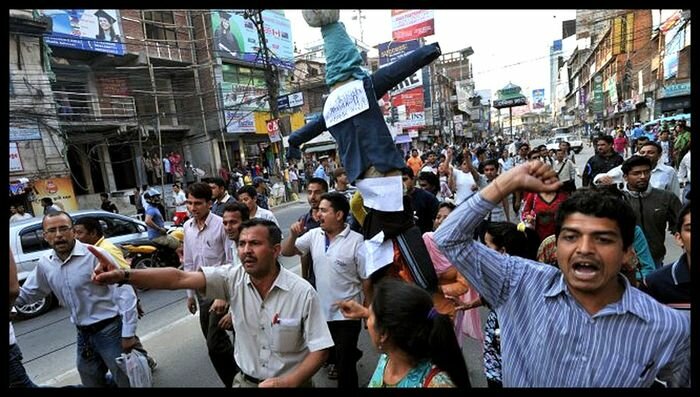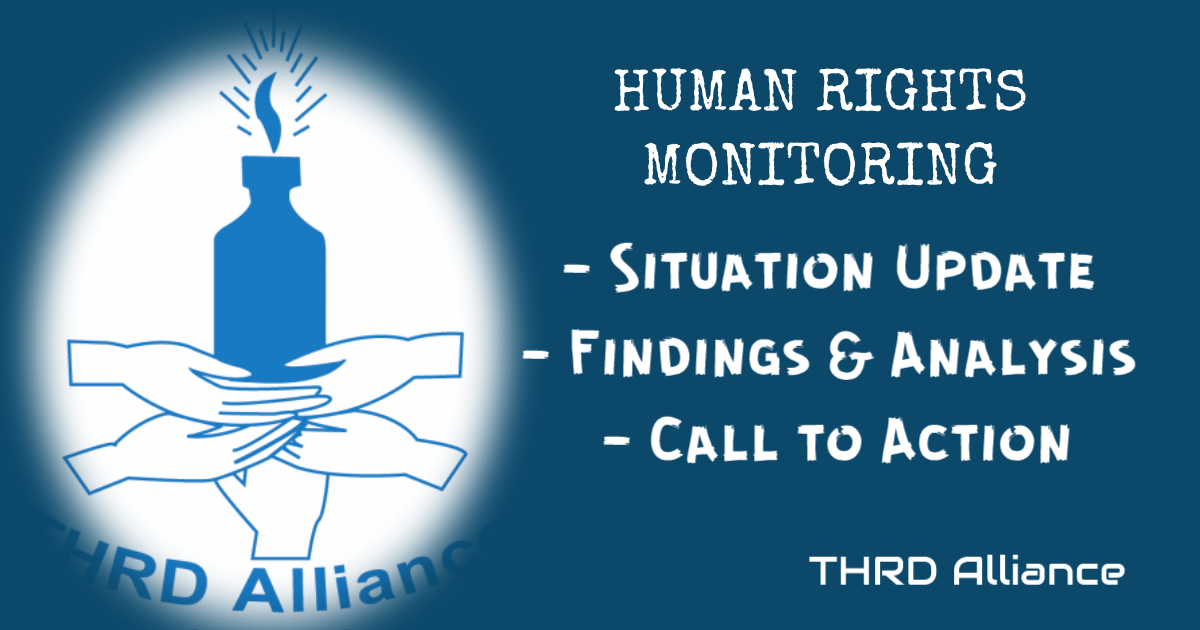On the International Human Rights Day 2017, we call on the Government of Nepal to
-
effectively implement the High-Level Inquiry Commission’s Report on Terai killings to be published next week
-
immediately pass the anti-torture bill to criminalise torture in line with international human rights law to ensure justice to the torture victims
-
ensure the justice to the family affected by a decade-long civil war (1996-2006) through the effective functioning of the transitional justice mechanism
Today Nepal joins the world commemorating the 69th International Human Rights Day. It was on December 10, 1948, that the United Nations launched the Universal Declaration of Human Rights (UDHR), which was the first comprehensive international human rights document. This day, therefore, should remind the entire world as to what we have achieved thus far to protect and promote human rights. For Nepal, it should be a moment of introspections and reflections. This day should remind us what we have achieved thus far to ensure human rights of our citizens particularly of the marginalized sections of society who continue to be victims of discrimination- structural and otherwise.
Against the backdrop, THRD Alliance calls on the Government of Nepal and all the stakeholders, including national and international human rights bodies, to redouble their efforts to prevent human rights violations and to punish those who are responsible for violating human rights.
In October 2016, the government of Nepal formed the High-Level Inquiry Commission (HLIC) to investigate the killings of over 50 persons due to the state’s crackdown on protests organized by Madhesi and Tharu communities objecting the contents of the Constitution of Nepal, 2015. THRD Alliance, in collaboration with Asian Human Rights Commission (AHRC), monitored the death of 34 persons and published the report — Nepal Protest and Repression – State Responsibility for 37 Killings During Protests in Terai. Likewise, Human Rights Watch also monitored the protests that continued for four-and-a-half months in 2015-16 and published the report – “Like We Are Not Nepali” Protest and Police Crackdown in the Terai Region of Nepal. The reports prepared by national and international human rights organizations, including the one published by National Human Rights Commission (NHRC), had also found a consistent pattern of excessive use of force.
In our communication with HLIC, we came to learn that the commission is submitting its report to the government within a week. Nepal has set a historic record of not making the reports of such commissions public and also, ineffective implementation of the recommendations made in most of the cases. Keeping this in mind, THRD Alliance urges both the commission and the government to ensure that the report is made public and the recommendations made by the commission are implemented effectively.
Earlier, in June, the UN Special Rapporteurs on Human Rights wrote a letter to the Government of Nepal requesting it to submit an update on the investigation’s progress made by the HLIC. The relevant sources confirmed that the government has not yet responded to the letter yet.
Upon the submission of the report, we call on the government to respond to the letter written by the UN Special Rapporteurs. Families of those who were killed by security personnel during Madhes movement are awaiting justice. Neither have families of those who were killed by security forces in Maleth of Saptari on 6 March 2017 got justice.
Second, Nepal should need to act accordingly to criminalize and impartially investigate acts of torture. During the most recent review of Nepal’s human rights record under the Universal Periodic Review (UPR) in November 2015, 73 countries criticized Nepal for the practice of torture among other human rights abuses. Although all the constitutions promulgated since 1990, including the 2015 Constitution, prevented torture but a comprehensive law is yet to be legislated to criminalize torture in line with international human rights law. In 2014, the government tabled a torture-related legislation in the parliament, which was a welcome step but the bill has to be further improved according to the recommendations made by the human rights community. Hence, we urge the government and human rights community to proactively engage in enacting the anti-torture bill. The immediate passage of the bill will be a great contribution to the fight against torture and also prevent the arrest of our officials in foreign lands under universal jurisdiction.
On top of that, families of conflict victims are still waiting to get justice. The Supreme Court had issued orders to the government to amend Truth and Reconciliation Act on lines with the international laws to ensure justice to conflict victims. The term of two transitional justice mechanisms – Truth and Reconciliation Commission (TRC) and Commission of Investigation on Enforced Disappeared Persons (CIEDP) – is about to end but the concerned body has not amended the Truth and Reconciliation Commission Act. The government needs to thoroughly investigate all the rights abuse cases and ensure that families of victims get justice with enough provisions for reparations.
International Human Rights Day should be an occasion for us to make a pledge to achieve the goals of equality. Promulgation of Nepal’s new constitution on September 20, 2015 was a historic event but this constitution is yet to do justice to some communities particularly Madhesis, indigenous nationalities (Janajatis), Dalits and women. The constitution does not give equal rights to women married to foreign nationals to transmit Nepali nationality to their children as is the case with Nepali men. This constitution discriminates against the citizens on grounds of types of citizenship. Naturalised citizens and citizens by birth are unfairly barred from holding more than 10 top constitutional posts.
The International Human Rights Day should be an occasion for us to do our soul searching and make a pledge to work for building a better society where everybody’s human rights are respected and everybody enjoys equal rights.




